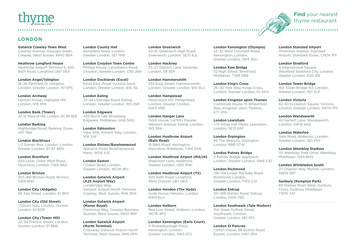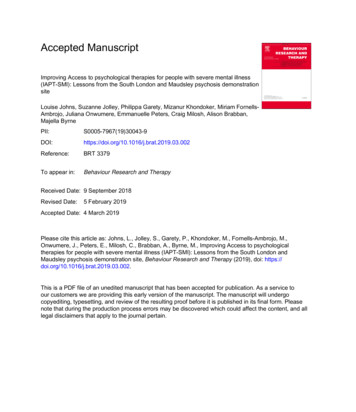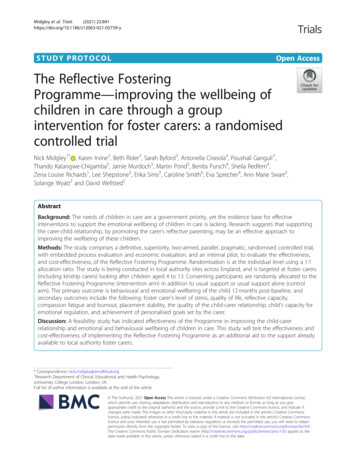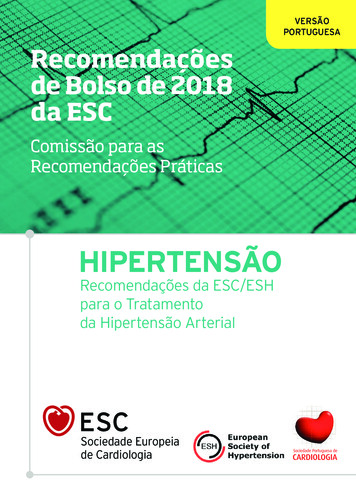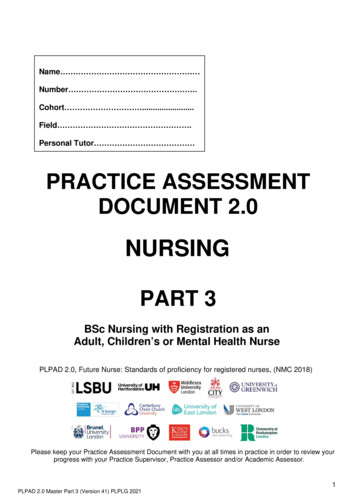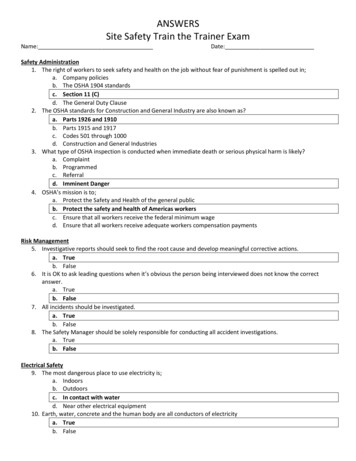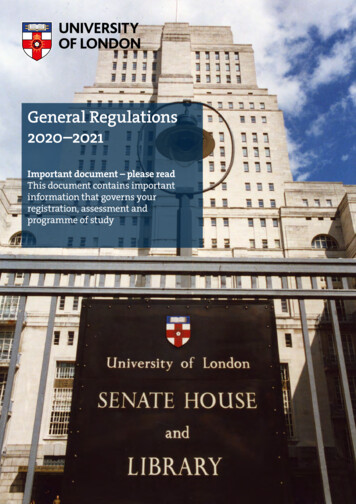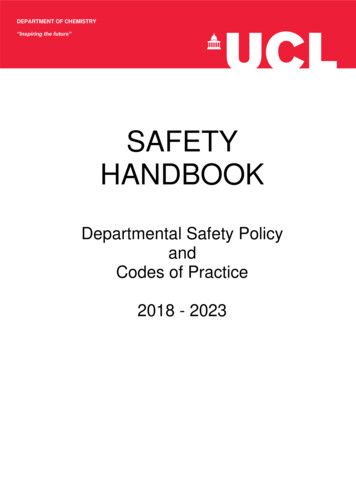
Transcription
DEPARTMENT OF CHEMISTRY“Inspiring the future”DEPARTMENT OF CHEMISTRYSAFETYHANDBOOKDepartmental Safety PolicyandCodes of Practice2018 - 2023
UCL Department of Chemistry, Safety Code of Practice (October 2018)INTRODUCTIONThis document contains the safety code of practice that applies in the Chemistry Department,and is complementary to the UCL Departmental Statement on Safety Policy, which can befound here - x.htmThe practical basis of safety hinges on a good code of working practice in matters such ashandling, storing and disposing of chemicals, room tidiness, provision and use of protectiveequipment and above all the intelligent recognition of the risks involved in what you are doing.The section on Assessment of Risks describes the general procedure for the assessment ofrisks and for the adoption of a code of practice for safe working that must be followed by everyperson who works in the Christopher Ingold Laboratories (CIB), the Kathleen Lonsdale Building(KLB) and Roberts Building.The remainder of the document comprises notes, under headings arranged alphabetically,which aim to provide the basis of a code of practice for safe working. The notes will need to besupplemented from time to time to include experimental procedures which they do not yetcover, and any comments should be sent to the Departmental Safety Officer (DSO).Membership of the CommitteeSee Safety Committee terms of reference later in this documentProfessor Claire CarmaltMr Brian KavanaghMr Crosby MedleyMr Joe NolanDr Michael ParkesProfessor Andrea SellaDr Caroline KnappDr Helen AllanMiss Debbie AllenDr Vicky HilborneMs Debbie Allen/Ms Nicola PhillipsMs Rachel FairfaxDr Kersti KaruHead of Department (HoD)Departmental Safety Officer & Chair of Committee (DSO)Technical Services Safety RepresentativeBuilding Manager/Senior Fire Marshal (FEM)Departmental Laser SupervisorSustainability OfficerDeputy Safety Officer/Inorganic & Materials SectionRepresentativeOrganic Section RepresentativeTeaching Laboratories Safety OfficerTeaching Committee RepresentativeCommittee SecretarySafety Services RepresentativeMass Spec ServiceSTATEMENT BY THE HEAD OF DEPARTMENTThis Code of Practice has my authority and all persons who work in the Chemistry Departmentmust abide by itProfessor Claire J. CarmaltHead of Department2
UCL Department of Chemistry, Safety Code of Practice (October 2018)EMERGENCY PROCEDURESFIREBreak fire alarm glass and leave department via central staircase or emergency exits to fireescapes.ACCIDENT/INCEDENT OR “NEAR MISS”Go to the Safety Services page and follow the link to ‘report an incident’ or use the followingURL http://www.oshens.com/ucl/AIR2/Incbook/incbook tab begin.aspxThe system records incidents and notifies key people so the incident can be investigated.MAJOR INJURYDial 222 and request an ambulanceMINOR INJURYContact a first aider (below) and treat within the department, or escort to UCH A&E Department,235 Euston Road (tel. 0845 155 5000)FIRST AIDERSPlease note the list of first aiders is subject to change. Up to date lists can be found by the lifts.Christopher Ingold BuildingKathleen Lonsdale BuildingBasementSecond Floor(F) Nafsika Forte - Rm 230 Ext:33451(M) Theodore Hayes (237)Ground Floor(M) Tony Field (Stores G22, Ext: 27450)(M) John Buckeridge (355, Ext: 30486)(M) Brian Kavanagh (G16D, Ext: 28550)West End Second floor(F) Kerstin Sander (208, Ext. 37036)First Floor(M) Michael Parkes (123, Ext: 24667)Second Floor(M) Crosby Medley (201E, Ext: 24643)(F) Claire Gacki (Rm 201, Ext: 24661)(M) Martyn Towner (201, Ext: 24661)(F) Debbie Allen (Rm 229, Ext 21500)Third Floor(M) Sebastian Dixon (310)Fourth Floor(F) Helen Allan (457C, Ext:24714)(M) Matt Powner (408, Ext: 24524)3
UCL Department of Chemistry, Safety Code of Practice (October 2018)FIRE EVACUATION MARSHALSChristopher Ingold BuildingKathleen Lonsdale BuildingBasementSteven FirthKersti KaruJim PercivalSecond FloorJonathan Wilden33395Third FloorScott Woodley30315246382460524719Ground FloorTony FieldBrian KavanaghLouise PriceSarah Price27450285502758324622Second FloorClaire GackiAlan PhilcoxMichael PorterAndrea SellaDavid Webb2150021500247102468724675Third FloorJeremy CockcroftMartin Vickers2580225592Fourth FloorHelen AllanRobert Palgrave2471425085Not assigned by locationRobert BellJohn BernardChris BlackmanThomas BridgesJadranka ButoracClaire CarmaltDewi LewisElizabeth ReadMartyn TownerSENIOR EVACUATION MARSHALSJoe NolanCrosby 792460024660
UCL Department of Chemistry, Safety Code of Practice (October 2018)UCL Health and Safety ProvisionListed below are UCL services. In most instances, issues should be addressed throughdepartmental procedures and personnel in the first instance.Hazardous Waste Disposal Service:Estates Customer Service Desk30000Safety Services:safety@ucl.ac.ukGeneral safety enquiries or questionsGo to URL www.ucl.ac.uk/estates/safetynetOccupational Health32802Fire safety enquiries or issuesfire@ucl.ac.ukQuestions or problems relating to RiskNET toolsrisknet.help@ucl.ac.ukEnquiries about safety training coursessafetytraining@ucl.ac.ukAdvice about transporting dangerous goodsdangerousgoods@ucl.ac.uk5
UCL Department of Chemistry, Safety Code of Practice (October 2018)Contents:INTRODUCTION . 2EMERGENCY PROCEDURES . 3FIRE. 3ACCIDENT/INCEDENT OR “NEAR MISS” . 3FIRST AIDERS . 3FIRE EVACUATION MARSHALS . 4UCL Health and Safety Provision . 5Contents: . 61 ACCESS TO AND USE OF BUILDING . 102 ACCIDENTS AND INCIDENTS . 113 ASSESSMENT OF RISKS . 114 BASIC FIRE SAFETY TRAINING . 135 BICYCLES . 136 CENTRIFUGES . 137 CHEMICAL HAZARDS . 13Explosives . 14Highly Flammable Chemicals . 15Highly Reactive Chemicals . 16Toxic Chemicals . 168CHEMICAL REGULATIONS . 17Euratom . 17Chemical Weapons Convention . 17Schedule 1 . 17Schedule 2 . 19Schedule 3 . 1991011121314151617Clothing and Dress Code in Laboratories . 22COMPUTERS & RELATED EQUIPMENT . 22COSHH REGULATIONS. 22CRYOGENICS . 22CYANIDES . 23DISABLED PERSONS . 24Disabled Students: . 24DISPLAY SCREEN EQUIPMENT (DSE) . 25DISPOSAL OF WASTE . 25Chemical Waste (not solvents) . 25Waste Solvent . 26Empty bottles . 27Solid Waste. 27Syringe Needles . 27Laboratory Waste . 2818 ELECTRICAL APPARATUS . 28Inspection . 2819 EMERGENCY PROCEDURES . 29The fire alarm sound . 29On discovering a fire . 306
UCL Department of Chemistry, Safety Code of Practice (October 2018)Explosion, major spillage or other imminent danger . 30Release of toxic substance . 31The Hazards Laboratory . 31202122232425EMERGENCY CHEMICAL SPILLS . 32EMERGENCY SHOWERS AND EYEWASH STATIONS . 32EXPLOSIONS & IMPLOSIONS. 32EYE PROTECTION . 32FIRE . 33FIRST AID . 33Minor Injuries . 33Serious Injuries . 33First Aid Boxes . 33First Aid Room . 3326 FOOD & DRINK . 3427 FUME CUPBOARDS . 3428 GAS CYLINDERS . 35General . 35Flammable Gases . 36Acetylene and Liquefied Petroleum Gas (LPG) . 36Carbon Monoxide . 37Cylinder Checklist . 3729 Gloves. 37Introduction . 37Selection of gloves . 38General Laboratory Chemical Glove use . 39Mechanical protection gloves . 40UV protection (laboratory) . 40Gloves used to Protect from heat . 40Gloves used to protect from cold . 4032 HAZARDS LABORATORY. 4033 HOUSE VACUUM SYSTEM . 4134 HOUSEKEEPING . 41Guidelines for housekeeping: . 4135 HYDROGEN FLUORIDE (HYDROFLUORIC ACID) . 42HF Checklist . 4236 LABELLING CHEMICALS . 4337 LASERS. 43Use of Laser Equipment . 4338394041LEAD COMPOUNDS . 44LIFTS . 45MAGNETIC FIELDS. 45MAINTENANCE OF THE BUILDINGS . 45Christopher Ingold Building . 45Kathleen Lonsdale Building: . 4642 MANUAL HANDLING . 467
UCL Department of Chemistry, Safety Code of Practice (October 2018)43 MERCURY METAL . 46Mercury Checklist . 474445464748495051525354555657NOISE. 47NOTEBOOKS . 48OIL BATHS . 48OUT-OF-HOURS ASSISTANCE . 48OUT-OF-HOURS WORKING . 48OVERNIGHT EXPERIMENTS . 48OXYGEN DEPLETION MONIORS AND GAS DETECTORS . 48OZONOLYSIS. 48PERCHLORATES . 49PEROXIDES . 49PERSONAL SAFETY. 50POISONS . 50PREGNANT WORKERS . 51RADIOACTIVE ISOTOPES . 51General . 51Safety Precautions . 52Spillages . 52Disposal . 53Work with Thorium and Uranium (depleted or natural) . 5358596061626364656667RADIOS . 54REFRIDGERATORS AND DEEP FREEZERS . 54SAFETY COMMITTEE . 54SAFETY INSPECTIONS . 54SAFETY TRAINING COURSES. 55SEIZED (STUCK) GLASS APPARATUS . 55SMELLY CHEMICALS . 55SMOKING . 55SOLVENT STILLS . 56STORAGE OF CHEMICALS IN LABORATORIES . 56General . 57Flammable Solvents . 57Poisons . 57Smelly Chemicals . 57Heat-sensitive Materials. 57Labelling . 5768 SUMMER STUDENTS . 5869 SUPERVISION . 5870 TECHNICAL SERVICES & OTHER THIRD PARTIES . 5871 ULTRAVIOLET SOURCES . 5972 UNATTENDED EXPERIMENTS . 5973 UNDERGRADUTE RESEARCH PROJECTS . 6074 VISITORS . 6075 X-RAY DIFFRACTION . 60APPENDIX 1: Common carcinogenic substances . 62Common Carcinogenic Substances . 62The following have also been identified as strong carcinogens: . 62The following compounds have been identified as experimental carcinogens: . 62APPENDIX 2: Poisons. 638
UCL Department of Chemistry, Safety Code of Practice (October 2018)APPENDIX 3: Working with Display Screen Equipment . 64ADVICE AND INFORMATION FOR USERS . 64Basic Recommendations to Avoid Muscular Skeletal Disorders . 65APPENDIX 4: Laser User Registration Form . 6676 APPENDIX 5: Risk Assessment for Special Experiments. 689
UCL Department of Chemistry, Safety Code of Practice (October 2018)1ACCESS TO AND USE OF BUILDINGThe Christopher Ingold Building and the Kathleen Lonsdale Building are open between 08:00and 18:00, Monday to Friday. Outside of these hours’ access is by use of a keycard (UCL IDCard), which operates the lock on the designated out-of-hours door.Out-of-hours access to the Chemistry Department must be recorded in the books located inreception (CIB) or the second-floor lobby (KLB). If you are already in the department at 18:00,you must sign the out-of-hours book if you intend to stay later.Undergraduates, taught postgraduates and visitors are allowed access to the department onlybetween 08:00 and 18:00, Monday to Friday.Nobody is allowed in the department for any reason between the hours of 00:00 and 06:00.Any type of risk-assessed work is permitted in the Chemistry Department between 07:00 and21:30, Monday to Sunday (except when College is closed at Christmas, Easter and on BankHolidays), subject to the constraint that experimental work must not be attempted unless atleast one other worker is in the same laboratory, or within earshot, and will be so for theduration of the experiment. Use of liquid nitrogen or any energetic process (energetic reactionsor pressurised equipment) must never be undertaken unless other people are present!Outside of these hours (and subject to the restriction between 00:00 and 06:00 mentionedabove), members of the department are granted access ONLY in order to do written work attheir own desk, to operate computer terminals and carry on activities such as pre-bookedmeasurements on equipment such as the NMR spectrometers and X-ray diffractometers. Thefollowing rules apply:You must fill in the out-of-hours book on entry and departure.Your supervisor must give permission for you to be in the building (research students only).You must not admit anyone else to the building except for your own guests. All visitors mustsign in on entry and sign out when they depart.If it is foreseen that work has to be continued after 21:30 (e.g. collection of data), an extra riskassessment and protocol must be authorised by your supervisor and copied to the DSO.Nobody is permitted to work alone. Security must be informed by contacting Mark West (x37321).Working outside the permitted periods will result in disciplinary action, which could includeremoval of access to the department.Guests to the department must be accompanied at all times by their host.A UCL ID card is provided for the use of only the worker to whom it was issued – it may not beloaned to any other person nor used to admit another person to the department. Failure toobserve any of the above will result in the withdrawal of your keycard.10
UCL Department of Chemistry, Safety Code of Practice (October 2018)2ACCIDENTS AND INCIDENTSAll accidents and safety incidents must be reported. They should be recorded using the‘RiskNET’ online reporting tool. By either going to the UCL Safety Service webpage andfollowing the ‘report an incident’ link or by visiting:LINK: http://www.oshens.com/ucl/AIR2/Incbook/incbook tab begin.aspxAn accident is an unexpected, undesired event which causes injury to a person or damage tothe contents or fabric of the building. An incident is an unexpected, undesired event without theconsequences i.e. no injury or damage, but which had the potential to do so. Whether one orthe other occurs is often down to luck, so it is important that all accidents and incidents arereported and investigated - if an incident goes unreported (and no steps are taken to preventrecurrence) it may well become an accident the next time it happens!Significant incidents should be reported to the DSO as soon as possible. Record details asimages using a camera or mobile phone and add them the incident report or send them to theDSO.For more information on incident reporting see the Safety Services website:LINK: cidents/index.htmUndergraduates and visitors to the department:Accidents and incidents occurring to undergraduates in the Graham Laboratory or the TurnerLaboratory should be recorded on the online system as above.3ASSESSMENT OF RISKSBefore any work is carried out, all significant hazards involved must be identified necessary riskcontrol measures to reduce the risk to an acceptable level must be put in place and ifappropriate a standard operating procedures produced. The procedure for doing this isexplained below.Regulations require that, before the start of any research project, the risks involved must beassessed and a method for safe working must be written. It is the responsibility of thesupervisor to ensure that workers are trained as necessary and follow the method.The risks involved in the work carried out by support staff must be assessed by their linemanager and an appropriate code of practice must be written, if necessary. It is theresponsibility of the line manager to ensure staff are adequately trained and follow the code ofpractice.ALL workers must carry out a “suitable and sufficient” risk assessment of their work before theymay begin –the risk assessment for the project should be recorded on the RiskNET RiskAssessment tool, this risk assessment should then be supplemented by additional riskassessments in laboratory books where appropriate.If all the work will be covered by the code of practice outlined in this document, completion ofthe risk assessment will be sufficient. If any operations will be carried out which are not covered(e.g. high pressure hydrogenation, use of pathogens or work with very toxic substances) asupplementary code of practice must be written and sent to the DSO. A template for doing thisis shown in Appendix 5.11
UCL Department of Chemistry, Safety Code of Practice (October 2018)The use of the RiskNet Risk Assessment will generate an email to the supervisor or linemanager (selected as ‘approver’) and work must not begin until receipt of this email has beenacknowledged by the supervisor to the worker or a notification that the assessment has beenapproved is received. Acknowledgement signifies agreement by the supervisor is satisfied thatthe precautions identified are sufficient and the people involved have the necessary skills andresources to safely undertake the activity. Staff who don't have a supervisor are responsible fortheir own answers to the risk assessment.Risk assessment must be reviewed at least annually, if the nature of the project should changeor if unforeseen new hazards should be encountered.All research workers must check on a day-to-day basis that their work falls within the agreedcode of practice. It is the responsibility of the supervisor to ensure that this is being done. Eachresearch worker must write in a bound notebook an account of each experiment as it is beingcarried out. This must be dated, and every experiment must be preceded by a written record ofthe risk assessment and the code of practice which will be followed.Every laboratory w
UCL Department of Chemistry, Safety Code of Practice (October 2018) 5 UCL Health and Safety Provision Listed below are UCL services. In most instances, issues should be addressed through
